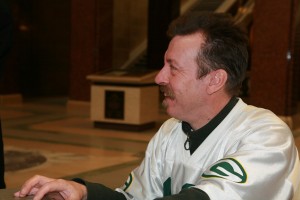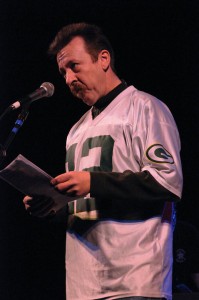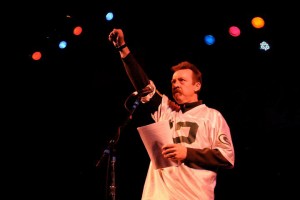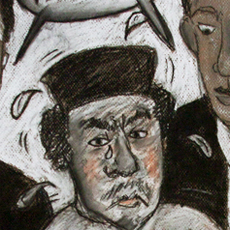Before the March and April protests against the Budget Repair bill in Madison, Wisconsin, Matthew Schauenburg was a motorcycle mechanic who considered himself only mildly politically engaged. When the bill was introduced by Wisconsin Governor Scott Walker, Schauenburg sprung into action: not only was he picketing outside the Capitol Building from the start of the protests, but Schauenburg also initiated a hunger strike that lasted 28 days and nearly killed him.
After declaring a small victory on April 1, Schauenburg ended his hunger strike, but continues to engage actively in the ongoing fight for citizens’ rights in Wisconsin. F News interviewed Schauenburg over the phone on April 12 about his experiences at the Capitol. “It was really wonderful to be at ground zero at such a moving time in history, as far as social and political agendas go,” Schauenburg told F News. “I kind of feel like I’m right in the middle of one of my generation’s defining moments.”
Jennifer Swann: When did your hunger strike officially end and how’ve you been doing since then?
Matthew Schauenburg: The hunger strike ended on day 28, [April 1st], that was due to [Judge Maryann Sumi’s] ruling and the temporary restraining order locking everything up in court. There’s no way to continue a hunger strike against a restraining order. It would have gone from a politically motivated act of civil disobedience to a pretty much intentional act of suicide. Especially since we had no idea how long that restraining order would tie things up.
JS:What’s the status of the restraining order now and what are the details of it?
MS: That still needs to be hammered out. We’re waiting on the government accountability board and the recounts in the Supreme Court’s Race, we’re waiting on the PRO, basically we’re waiting for the pieces to fall into place here so we can see what our next course of action’s going to be, see how the Republicans are going to react, and basically waiting for them to call the next show and then we’ll go from there. But for right now, we’re trying to keep people mobilized, keep people on top of the issue, because things have kind of stalled out for the moment and it makes it doubly hard for us.
JS:How are you keeping people aware of what’s going on, aside from your blog and online networking?
MS: Right now there’s a lot of organizing going on. We have a lot of day-to-day contact, we have people involved in observation of the recount, we still have a lot of people out on the field in the recall effort. Those folks of course are very dedicated and have kept going. The trick right now is we’re trying to figure out how to keep the general public aware of the issues, so we have the public interest and we have the turnouts for the recall elections and that’s proven to be a little bit of a challenge. Like I said, we’re doing a lot of organizing and networking right now, just making sure people are maintaining awareness of what’s going on and that they’re prepared to act in the future.

JS: Are you banded together with a certain group, are you formally organized, or it is a loose collective of people who have been protesting this bill?
MS: Myself personally, I’m more or less, independent and on my own. Citizens’ journalist group politiscoop.com, I’m meeting up with them right now, they’re very good at getting stories out, they’re good at working with the media. I’m also doing a little bit of networking with some other groups, doing some organizing. Right now we’re getting ready, Saturday [April 16th] is the tea party rally, here at the Wisconsin state capitol, so we’re keeping our eye on what they’re doing, and we’re preparing to show up in much greater numbers and anything they can bring up, we’re reminding people about that.
JS: Do you see yourselves starting to tackle other issues besides the bill and besides labor rights?
MS: Right now there is so much going on with Wisconsin, it’s pretty much all we can focus on. I’ve always been a politically aware person, I’ve never necessarily been very politically active much beyond voting and trying to understand the issues. There’s a lot going on here that’s going to keep us all busy for quite a while. We have to [understand] not just workers’ rights, but pretty much citizens’ rights, the effects of the financial aspects of the budget repair bill would just be absolutely devastating. A lot of other states are dealing with similar issues right now, and there’s just so much going on at this level that its sort of hard to see what would be coming up on the horizon beyond this.

JS: Where did the idea for the hunger strike first start?
MS: Well I was part of the protests from day 1, and after a couple of weeks, it became pretty apparent that there would be no concessions, or not even negotiations possible under Governor Scott Walker, and so it was time to step things up. The people of Wisconsin have a very desperate situation, and [Scott Walker] received some very desperate forms of protest in opposition to what he was trying to do.
JS: Did most people at the Capitol know what you were on a hunger strike?
MS: I learned a lot and I basically did everything completely backwards. Basically I just sat down with my sign at one half of the rotunda and just waited for things to kind of come together on their own. I didn’t know what to expect, I didn’t really understand media relations at the time. It’s kind of fascinating for me when Anna Hazare in India got so much international media attention on his hunger strike in regards to corruption in their government, so my whole point of view [is that] I could have run a much more effective hunger strike campaign against Governor Scott Walker.
It was actually the people from PoliticScoop, particularly, who heard about me and picked up on the story. They really pushed and got the media attention for me. I don’t know if [mainstream media outlets] didn’t know how to deal with the story hunger strike, if they were confused about how to record it, but it seems more or less they intentionally ignored me, they largely ignored everything that was going on here. If they did give us any media attention, things were misrepresented, under-reported; we could put 150 or 175,000 people on the square and we would get a little half-page story at most saying there were upwards of 50 to 85,000 on the square, so its been really downplayed or not covered at all in Wisconsin media.
National and international media attention really exploded after PolitiScoop brought out the story and got the word out there to the internet press. One thing that’s been really fascinating to me, right before this happened in Wisconsin, of course we watched the events in Egypt unfold and I kept hearing so much about how facebook was the big moving force behind that social and political movement, which seemed very doubtful to me. I thought they were overplaying the role of Internet media and networking, but when it came to my own hunger strike, it was the first time I had ever set up a facebook page and a blog, and its really amazing the effects of the social networking sites and how much mobilization it can create. I never realized how much of a useful tool for communication it was, that’s just one of the things I’ve learned during the hunger strike and the period since.

JS: What was the goal of the hunger strike? Did you initially set a goal of how long you would strike for?
MS: I don’t really see a point in initiating a strike unless you’re committed to carry it through to whatever end may come. I was getting very concerned in the last week, but the rulings on the restraining order came at a very fortuitous time. The medical people I was getting advice from informed me on Thursday [April 1st], the day before I ended the hunger strike, that I had started to experience organ failure. I was probably looking at anywhere from three-eight days left. So it was very fortuitous timing that things came together when they did, and basically allowed me to walk away from the hunger strike with a sense of honor and victory, since I was getting down to a very very short time.
JS: On your blog, you declared April 2nd victory day. Why is that?
MS: It wasn’t an outright victory. I consider it a half victory, or a small victory; basically myself, the other protesters, everyone who got involved, the citizenry of Wisconsin, we took on Scott Walker, we had a majority of the Senate in assembly, and basically were able to wrestle him to a standstill. That’s what I consider the real victory involved.
JS: Can you talk about your life before the hunger strike?
MS: Basically, my core values haven’t changed, my situation hasn’t really changed except I’m just trying to get my life back on track again. Now that the hunger strike has hopefully come to a permanent end, I’m trying to go on with everything I normally did, and find the time to network and organize and stay on top of everything, and prepare for future rallies.
JS: How can other people get involved in this movement, even if they live outside of Wisconsin?
MS: Anybody that has the time to get involved in the recall efforts, help in canvassing and organization, we still have some numbers to generate in that regard. I know people are very busy with their lives and jobs and families, but I feel Americans should have a sense of obligations to keep abreast of the issues, keep themselves informed, and get out there and vote. We’re going to need votes on the recall efforts, right now we’re working on the Republican senators, getting them recalled and replaced, then we’re moving on to the assembly, then in January, [we’ll take on] the Governor himself.
Follow Matthew Schauenburg’s blog at hungryguymadison.blogspot.com/
View Amber Solow’s photos of the Madison protest on flickr.com/photos/59908625@N08/








Heckuva good job. I sure aeppcriate it.